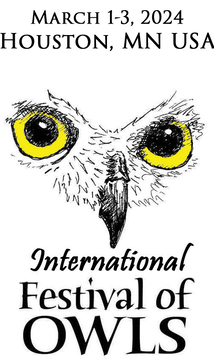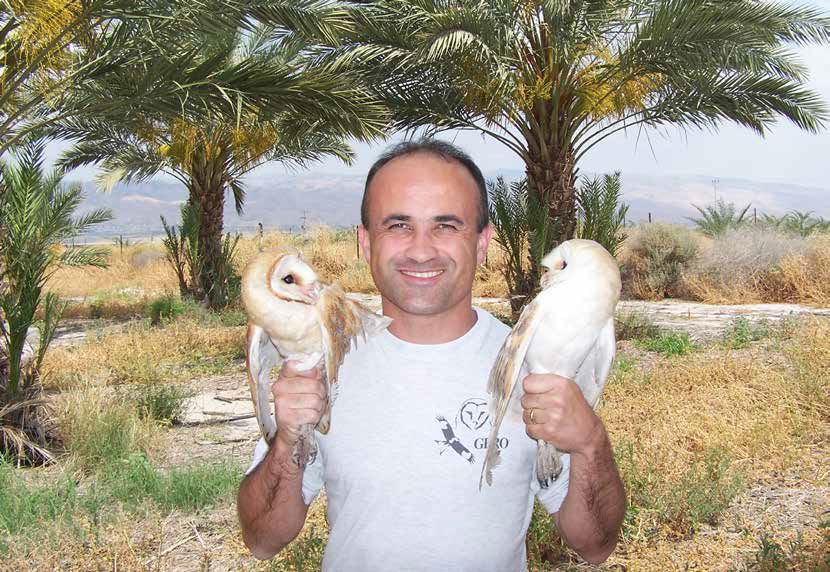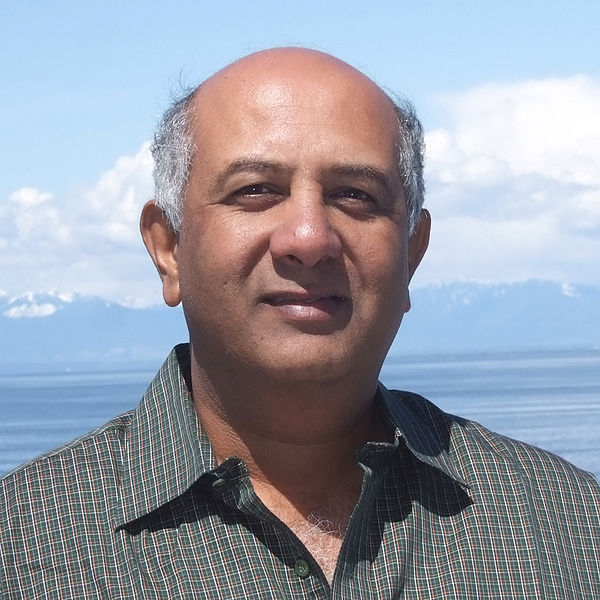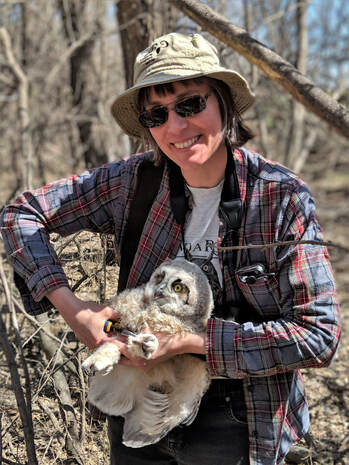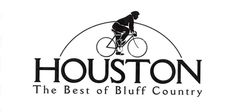Champion of Owls Award
Dr. Alexandre Roulin, Switzerland
Dr. Alexandre Roulin’s focused and extensive work with Barn Owls over the past 35 years has earned him the World Owl Hall of Fame’s prestigious Champion of Owls Award. His topics of study include parent-offspring conflict, sibling negotiation, evolution, maintenance, genetics, breeding behavior and diet. The subject that has most captured his attention is the color variations of Barn Owls. It isn’t fully understood why some Barn Owls are very pale and others are much darker, and Dr. Roulin has set to understand why.
Over the past 32 years, Dr. Roulin has put up and monitored 800 nest boxes for Barn and Tawny Owls. His work set the basis for Barn Owl conservation programs in his home country of Switzerland and elsewhere in Europe. Dr. Roulin has also become involved in efforts to promote and support Barn Owls as the model species for building peace in the Middle East.
Dr. Roulin started worked with Barn Owls in 1986 as an amateur ornithologist, and began his official academic career in 1996, dedicating his Master’s Degree, PhD and postdoc to this fascinating group of birds. As a professor, he has worked with many amateur ornithologists, has overseen 20 PhD students and 11 postdocs, and supervised 96 Master’s projects, mostly focused on owls.
To date he has published 260 scientific papers, mostly on owls, and in 2020 Cambridge University Press published his book “Barn Owls: Evolution and Ecology”. In addition to writing, Dr. Roulin has given 182 presentations about his research at conferences and universities, as well as to the general public. He is a Professor in the Department of Ecology and Evolution at the Université de Lausanne, Switzerland.
Dr. Alexandre Roulin, Switzerland
Dr. Alexandre Roulin’s focused and extensive work with Barn Owls over the past 35 years has earned him the World Owl Hall of Fame’s prestigious Champion of Owls Award. His topics of study include parent-offspring conflict, sibling negotiation, evolution, maintenance, genetics, breeding behavior and diet. The subject that has most captured his attention is the color variations of Barn Owls. It isn’t fully understood why some Barn Owls are very pale and others are much darker, and Dr. Roulin has set to understand why.
Over the past 32 years, Dr. Roulin has put up and monitored 800 nest boxes for Barn and Tawny Owls. His work set the basis for Barn Owl conservation programs in his home country of Switzerland and elsewhere in Europe. Dr. Roulin has also become involved in efforts to promote and support Barn Owls as the model species for building peace in the Middle East.
Dr. Roulin started worked with Barn Owls in 1986 as an amateur ornithologist, and began his official academic career in 1996, dedicating his Master’s Degree, PhD and postdoc to this fascinating group of birds. As a professor, he has worked with many amateur ornithologists, has overseen 20 PhD students and 11 postdocs, and supervised 96 Master’s projects, mostly focused on owls.
To date he has published 260 scientific papers, mostly on owls, and in 2020 Cambridge University Press published his book “Barn Owls: Evolution and Ecology”. In addition to writing, Dr. Roulin has given 182 presentations about his research at conferences and universities, as well as to the general public. He is a Professor in the Department of Ecology and Evolution at the Université de Lausanne, Switzerland.
Special Achievement Award
Dr. Satish Pande, India
Dr. Satish Pande has been an owl enthusiast since his school days and has been working to help owls for the past 25 years despite being a medical doctor by profession.
Pande has conducted research on eight species of owls including the Spotted Owlet, Indian Eagle Owl, Barn Owl, Mottled Wood Owl, the critically endangered Forest Owlet, Brown Wood Owl, Brown Fish Owl and the Barred Jungle Owlet. He has published 15 scientific papers and 5 Life History Fact Files on owls. To foster the sharing of owl research around the world, he also led the organization of the 6th World Owl Conference in 2019, held in India (the first World Owl Conference in Asia.)
Because reaching the public is crucial to changing attitudes about owls and bringing awareness about the challenges they face, Pande has also focused on education. He has reached more than 100,000 people over 25 years through his more than 500 presentations at farms, schools, universities, government trainings, and festivals. He innovatively uses ethno-ornithology as a tool for owl conservation by drawing from the rich cultural heritage of India. He created the annual Indian Owl Festival in 2018, which engaged 12,000 people its first year and 15,000 people in the second year. He has also started a charitable hospital for rural communities in his field station Ela Habitat which has successfully attracted community participation in owl conservation.
To reach a broader audience Pande has also given talks over Indian national radio and television, created several owl conservation podcasts, spearheaded the making of three educational films about owls, and even co-authored India’s first owl comics in English and the local Marathi language. He also created a brochure about the owls of India.
In terms of working hands-on with owls, Pande has rescued and rehabilitated more than 250 owls with the permission of the Maharashtra Forest Department. He is also in charge of the Ela Transit Treatment Center, hospital for wild animals jointly run with the State Forest Department. He advises and trains forest department staff in various states in India on wild bird rescue and rehabilitation, and to date has trained over 150 individuals in education and research of owls. Many of these individuals are now working toward owl conservation in 6 Indian states.
Pande has won several awards for his work, including an Earth Heroes Award from the Royal Bank of Scotland, the Maharashtra State Biodiversity Board Award, Kirloskar-Vasundhara Green Teacher Award and several local awards in his hometown of Pune.
Dr. Satish Pande, India
Dr. Satish Pande has been an owl enthusiast since his school days and has been working to help owls for the past 25 years despite being a medical doctor by profession.
Pande has conducted research on eight species of owls including the Spotted Owlet, Indian Eagle Owl, Barn Owl, Mottled Wood Owl, the critically endangered Forest Owlet, Brown Wood Owl, Brown Fish Owl and the Barred Jungle Owlet. He has published 15 scientific papers and 5 Life History Fact Files on owls. To foster the sharing of owl research around the world, he also led the organization of the 6th World Owl Conference in 2019, held in India (the first World Owl Conference in Asia.)
Because reaching the public is crucial to changing attitudes about owls and bringing awareness about the challenges they face, Pande has also focused on education. He has reached more than 100,000 people over 25 years through his more than 500 presentations at farms, schools, universities, government trainings, and festivals. He innovatively uses ethno-ornithology as a tool for owl conservation by drawing from the rich cultural heritage of India. He created the annual Indian Owl Festival in 2018, which engaged 12,000 people its first year and 15,000 people in the second year. He has also started a charitable hospital for rural communities in his field station Ela Habitat which has successfully attracted community participation in owl conservation.
To reach a broader audience Pande has also given talks over Indian national radio and television, created several owl conservation podcasts, spearheaded the making of three educational films about owls, and even co-authored India’s first owl comics in English and the local Marathi language. He also created a brochure about the owls of India.
In terms of working hands-on with owls, Pande has rescued and rehabilitated more than 250 owls with the permission of the Maharashtra Forest Department. He is also in charge of the Ela Transit Treatment Center, hospital for wild animals jointly run with the State Forest Department. He advises and trains forest department staff in various states in India on wild bird rescue and rehabilitation, and to date has trained over 150 individuals in education and research of owls. Many of these individuals are now working toward owl conservation in 6 Indian states.
Pande has won several awards for his work, including an Earth Heroes Award from the Royal Bank of Scotland, the Maharashtra State Biodiversity Board Award, Kirloskar-Vasundhara Green Teacher Award and several local awards in his hometown of Pune.
Special Achievement Award
Karla Bloem, Minnesota USA
A little Great Horned Owl fell out of her nest in 1997 and changed the course of Karla Bloem’s life, and the ripples have been felt far and wide.
Karla Bloem was working as a naturalist and a falconer when Alice the Great Horned Owl came to work with her as an educational ambassador. As a human imprint, Alice began considering Karla to be her mate and expected Karla to behave like a proper male Great Horned Owl. The scientific literature was no help in understanding Alice’s language, so Karla began studying the vocalizations of the species in 2004. Eventually Karla acquired a non-releasable captive-breeding pair, steamed live video and audio of them online, and engaged viewers to help with observations of their vocalizations. The research spread from the complete vocal repertoire to individual recognition to vocal development, regional variation and more. One volunteer has spread her wings and now studies Eurasian Eagle Owl vocalizations in The Netherlands.
Early on Karla realized that Great Horned Owls were on Minnesota’s “unprotected birds” list despite being federally protected. She worked with representative Ray Cox, testifying before the Minnesota House and Senate environment committees to successfully gain protection for the species.
Due to Alice’s popularity, with the help of a growing army of volunteers Karla started the Festival of Owls in Houston, Minnesota as a hatch-day celebration for Alice. The event grew into an international event that launched the World Owl Hall of Fame awards to bring public recognition to people who were doing amazing things to make the world a better place for owls. The Hall of Fame is judged by a panel of exerts from around the world.
Now around 2,000+ people attend the Festival each year from around North America, while the population of the town is less than 1,000. Since many people didn’t want to come to Minnesota in early March to learn about owls, Karla launched a new non-profit organization, the International Owl Center, to provide the only all-owl education facility in the USA for people to come and visit. Even as a young organization in a very rural area, the Center has directly educated over 50,000 people in addition to at least 75,000 people Karla and Alice reached prior to the Center’s opening. Additionally, the Center’s website teaches people how to live an owl-friendly life, why owls don’t make good pets, effective owl education techniques, where to find a local rehabilitator and more, and reaches 500-1,000 people per day (at least 1.5 million people to date.) Karla and the Center also appear in the local, regional and sometimes national and international media on a regular basis.
Karla is part of a team working to organize the next World Owl Conference, and she co-organized a workshop on effective owl education methods at a previous owl conference. In order to begin creating a centralized go-to place for owl researchers around the world, the Owl Center created an e-newsletter that highlights recent owl research and conservation efforts. The Center also created a free Virtual Owl Expert Speaker Series to help share owl research with other researchers, rehabilitators, educators and the general public around the world.
Karla Bloem, Minnesota USA
A little Great Horned Owl fell out of her nest in 1997 and changed the course of Karla Bloem’s life, and the ripples have been felt far and wide.
Karla Bloem was working as a naturalist and a falconer when Alice the Great Horned Owl came to work with her as an educational ambassador. As a human imprint, Alice began considering Karla to be her mate and expected Karla to behave like a proper male Great Horned Owl. The scientific literature was no help in understanding Alice’s language, so Karla began studying the vocalizations of the species in 2004. Eventually Karla acquired a non-releasable captive-breeding pair, steamed live video and audio of them online, and engaged viewers to help with observations of their vocalizations. The research spread from the complete vocal repertoire to individual recognition to vocal development, regional variation and more. One volunteer has spread her wings and now studies Eurasian Eagle Owl vocalizations in The Netherlands.
Early on Karla realized that Great Horned Owls were on Minnesota’s “unprotected birds” list despite being federally protected. She worked with representative Ray Cox, testifying before the Minnesota House and Senate environment committees to successfully gain protection for the species.
Due to Alice’s popularity, with the help of a growing army of volunteers Karla started the Festival of Owls in Houston, Minnesota as a hatch-day celebration for Alice. The event grew into an international event that launched the World Owl Hall of Fame awards to bring public recognition to people who were doing amazing things to make the world a better place for owls. The Hall of Fame is judged by a panel of exerts from around the world.
Now around 2,000+ people attend the Festival each year from around North America, while the population of the town is less than 1,000. Since many people didn’t want to come to Minnesota in early March to learn about owls, Karla launched a new non-profit organization, the International Owl Center, to provide the only all-owl education facility in the USA for people to come and visit. Even as a young organization in a very rural area, the Center has directly educated over 50,000 people in addition to at least 75,000 people Karla and Alice reached prior to the Center’s opening. Additionally, the Center’s website teaches people how to live an owl-friendly life, why owls don’t make good pets, effective owl education techniques, where to find a local rehabilitator and more, and reaches 500-1,000 people per day (at least 1.5 million people to date.) Karla and the Center also appear in the local, regional and sometimes national and international media on a regular basis.
Karla is part of a team working to organize the next World Owl Conference, and she co-organized a workshop on effective owl education methods at a previous owl conference. In order to begin creating a centralized go-to place for owl researchers around the world, the Owl Center created an e-newsletter that highlights recent owl research and conservation efforts. The Center also created a free Virtual Owl Expert Speaker Series to help share owl research with other researchers, rehabilitators, educators and the general public around the world.
|
The International Festival of Owls is a fundraiser for the International Owl Center and the Center’s biggest event of the year.
|
